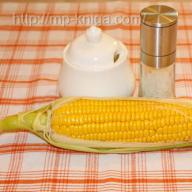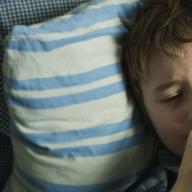Then the first question, for sure, will be “do I need to brush my teeth in early childhood?”. In addition, you will need to figure out which toothbrush and paste can be used for this procedure, how to teach the baby to use these items in general. All these questions will be answered in the presented material.
At what age should a child brush their teeth
Many mothers underestimate the importance of the procedure in question and start teaching the baby how to use a toothbrush late. Pediatricians say that cleaning the mouth and teeth should be started from the moment when the child already has at least one tooth. As a rule, this corresponds to the age of 5-6 months and at this time it is enough to carry out one brushing of the tooth per day.
Closer to one and a half years, the child will need to be taught to brush his teeth at least twice a day, and if this procedure does not irritate him, then three.
How to brush your child's teeth
Until the age of 1 year, the baby needs to clean his teeth and mouth with a soft cloth or gauze, which should first be moistened with water. On sale there are special nozzles on the finger in the form of soft rubber brushes that parents can use.
Closer to the age of one year (10-11 months), the baby can buy a toothbrush. This item should be selected individually, paying attention to the soft pile - there are toothbrushes on sale that are designed just for use by kids, and they will be the best option. In no case should the toothbrush injure the gums or enamel on the teeth.
Note:at the age of 3 years, apart from a toothbrush, the baby will not need anything else. Toothpastes, gels and powders are banned.
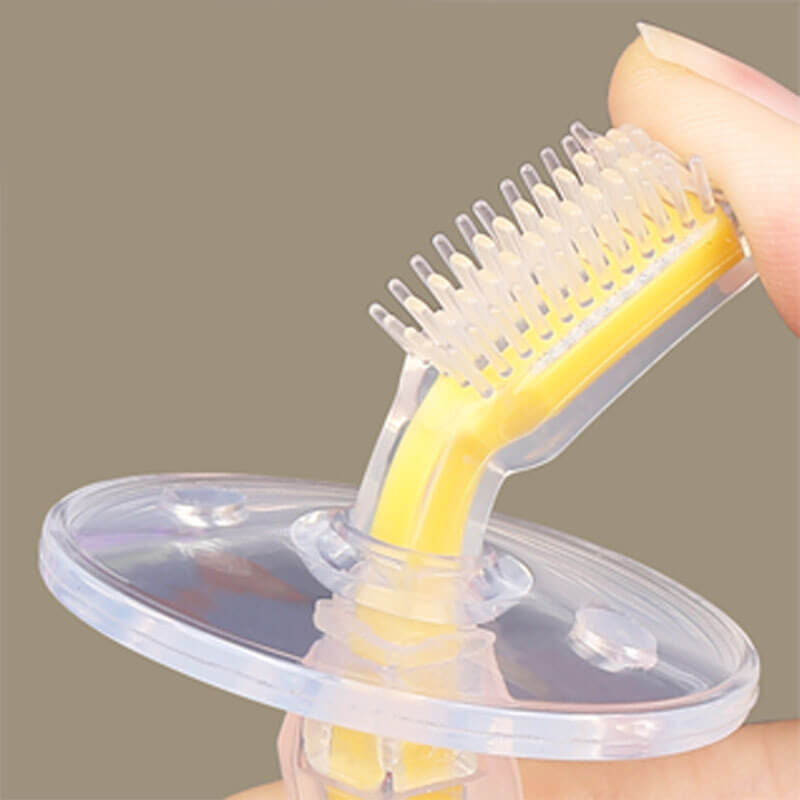 In the period of 1-3 years, the baby needs to brush his teeth and clean the entire oral cavity twice / thrice a day, and parents should do this. Of course, the child will try to carry out the hygiene procedure himself - you must immediately teach him how to hold a toothbrush correctly. But technically it is difficult for a child to brush his teeth and clean his mouth even at the age of three, so the help of parents will be needed in any case. Just a three-year-old baby can already buy a special, children's toothpaste.
In the period of 1-3 years, the baby needs to brush his teeth and clean the entire oral cavity twice / thrice a day, and parents should do this. Of course, the child will try to carry out the hygiene procedure himself - you must immediately teach him how to hold a toothbrush correctly. But technically it is difficult for a child to brush his teeth and clean his mouth even at the age of three, so the help of parents will be needed in any case. Just a three-year-old baby can already buy a special, children's toothpaste.
In order not to miss something important in the process of teaching a child to brush their teeth, parents should remember a few simple rules regarding oral hygiene appliances:
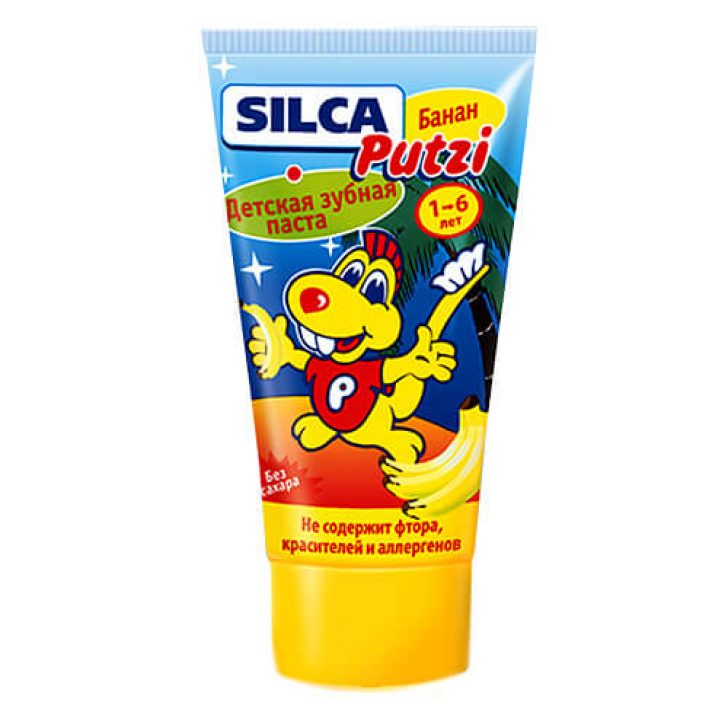
How to choose a toothbrush for a child
Experts say that parents will be able to choose the right toothbrush for their baby if they remember and use the following recommendations:
- You can not buy brushes made of natural bristles - pathogens multiply very quickly on such material. If a child uses just such a toothbrush, then stomatitis may develop in the oral cavity.
- If you are going to buy a toothbrush for a child aged 1-3 years, then when choosing, you should pay attention to its handle - it must be strong and thick so that the baby can confidently hold it.
- The bristles on the hygienic device in question should be collected in "section-groups", of which there should be 23 pieces.
- A child under the age of 5 should only use a very soft toothbrush.
- The length of the child's toothbrush head should not exceed 23 mm.
Some brands on sale have a complete set of hygienic devices under consideration: a thimble brush (suitable for a six-month-old baby), with a small head and a thick handle (will be the best option for a child of 1-2 years old), the largest (will speed up the child's learning process).
We recommend reading:General principles for proper brushing of teeth for a one-year-old child
As soon as the baby is 1 year old, you need to clean his mouth and teeth with a special brush with a long handle. Pediatricians and pediatric dentists note a bad trend - parents do not know how, and do not know how to properly brush their children's teeth, which leads to enamel abrasion and early caries. But it is enough to adhere to a clear algorithm to avoid such problems:
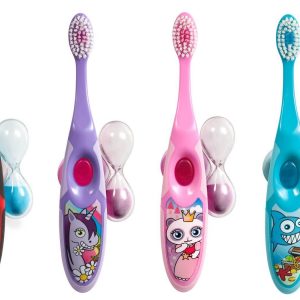
Another important point: pediatricians and pediatric dentists recommend brushing your baby's teeth for two minutes. This procedure may be unpleasant for the child, he may begin to act up, but you can find a way out of the situation - for example, buy an hourglass for 2 minutes and invite the child to keep track of time, or put a two-minute cartoon to watch.
How to teach your child to brush their own teeth
Quite often, parents are faced with the fact that the baby flatly refuses to brush his teeth on his own. In this case, you need to turn the process in question into a game! First, you need to buy him a beautiful, bright and unusual toothbrush. In addition to it, it is worth buying a “delicious” toothpaste, but only one that can be swallowed. Secondly, you can invite your child to play "cleaners" - whoever cleans their teeth better and more thoroughly will receive a prize (for this, you should stock up on bright stickers and healthy sweets). Thirdly, you can find films on the Internet about how to brush your teeth properly - demonstrating the “requirements” in action often has a positive effect on the desires of the baby.
Usually, by the age of 4-5, children are able to brush their teeth on their own. If the parents taught the child to this hygiene procedure from a very early age, then brushing your teeth will become a familiar “event”.
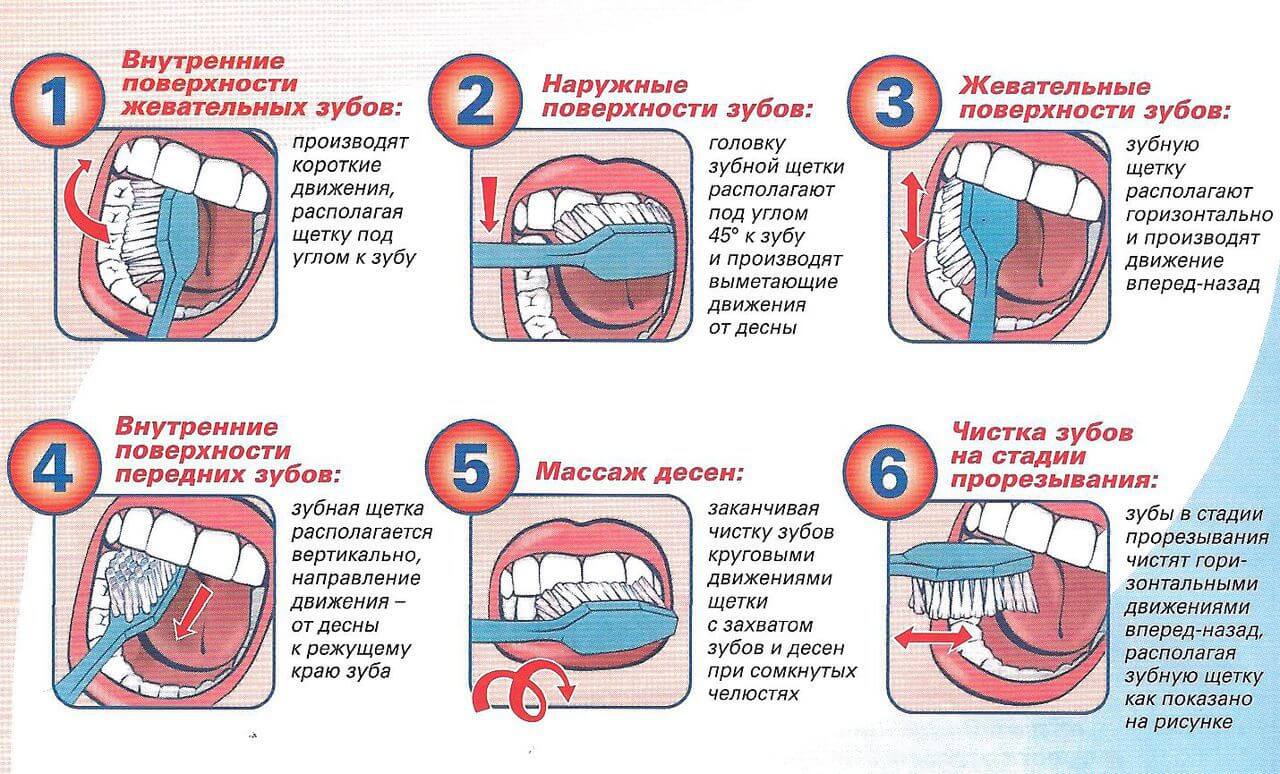
What is the need for children to brush their teeth
Many parents believe that the “milk” teeth of a child are temporary, they do not have any special function: “they will be replaced by permanent ones, then they will need to be cleaned.” This is the wrong opinion! It is very important to brush your teeth from early childhood and there are several reasons for this:
- milk teeth form and ensure the correct growth of permanent teeth;
- any teeth are involved in the formation of the bones of the skull, and therefore have a great influence on the formation of facial features;
- if brushing teeth is carried out irregularly, then pathogenic bacteria will enter the baby's body (from the oral cavity to the intestines), which can lead to the development of quite serious pathologies;
- if the care of the teeth and oral cavity is not carried out correctly, this will lead to the development

